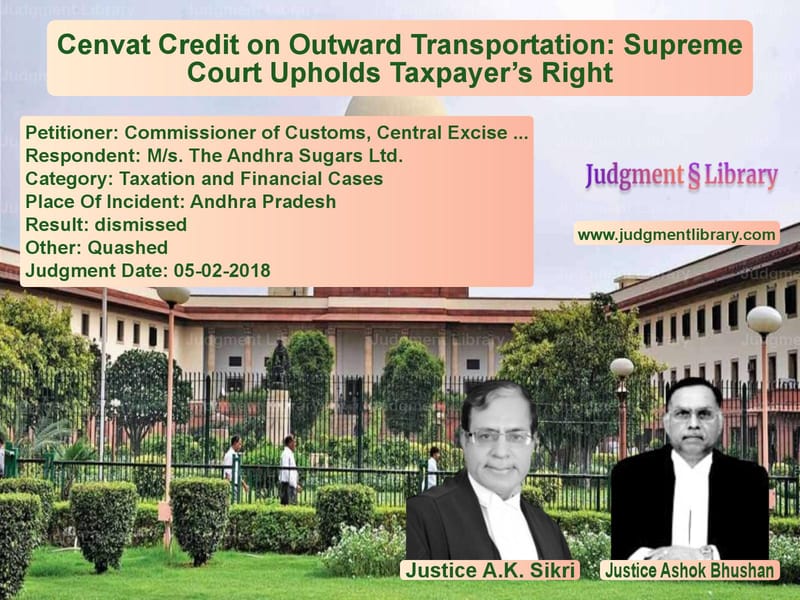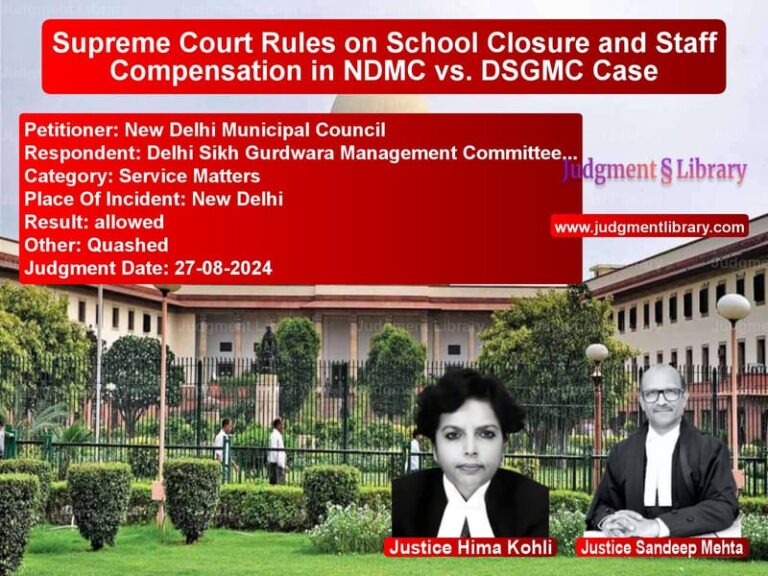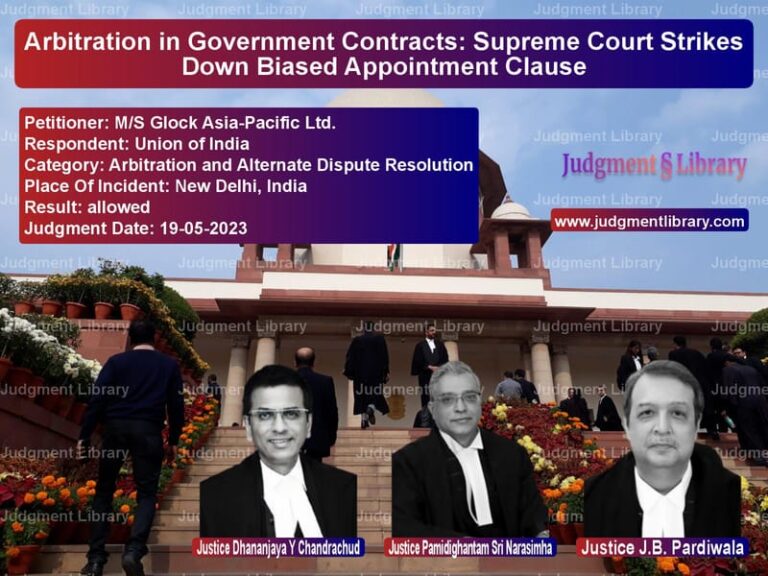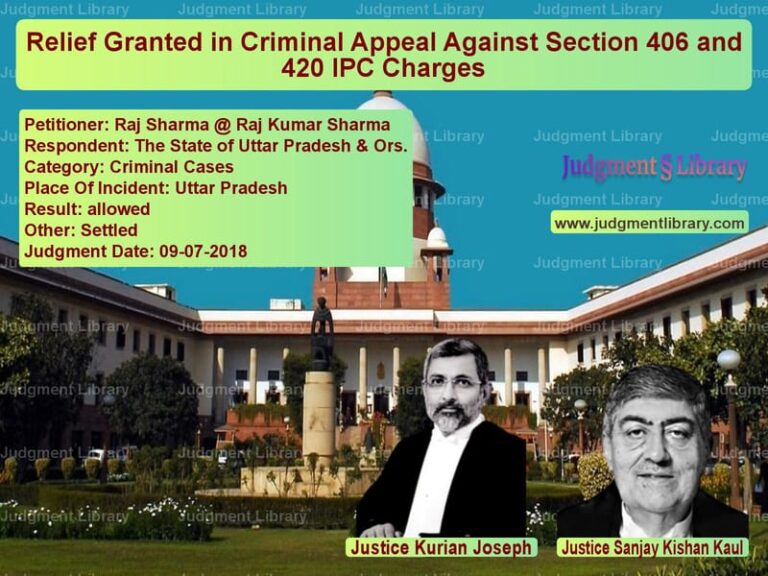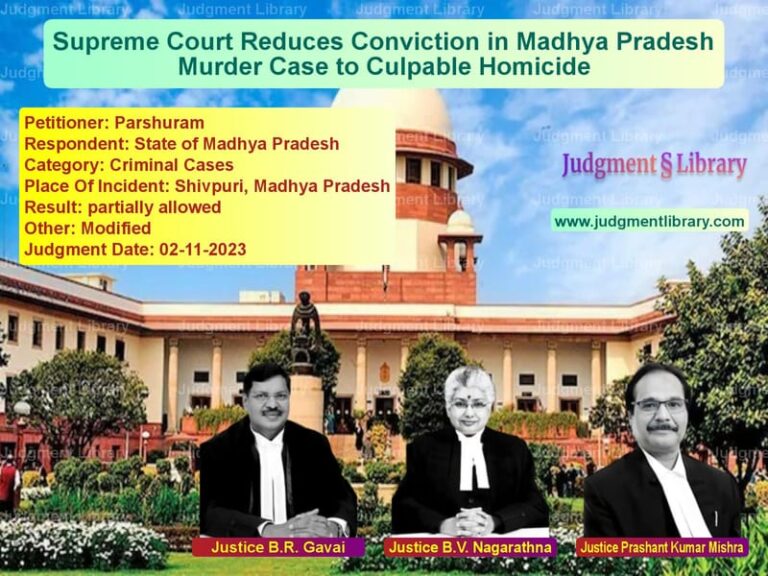Cenvat Credit on Outward Transportation: Supreme Court Upholds Taxpayer’s Right
The Supreme Court of India, in its judgment in Commissioner of Customs, Central Excise and Service Tax, Guntur vs. M/s. The Andhra Sugars Ltd., addressed a critical issue regarding Cenvat Credit on service tax paid for the transportation of goods beyond the place of removal. The case revolved around the interpretation of the term ‘input service’ under Rule 2(l) of the Cenvat Credit Rules, 2004, and whether Cenvat Credit could be claimed for service tax paid on outward transportation costs. The ruling reaffirmed that, under the law prevailing before April 1, 2008, such credit was indeed allowable.
Background of the Case
The respondent, M/s. Andhra Sugars Ltd., is engaged in the manufacturing of sugar, molasses, and other chemicals. During the period December 2007, the company availed of Cenvat Credit for service tax paid on transportation charges up to the customer’s location. However, the Revenue Department objected, claiming that such credit was inadmissible.
The dispute followed this path:
- The Assistant Commissioner of Central Excise issued a show cause notice demanding reversal of the credit, along with interest and penalties.
- The respondent appealed, and the Commissioner (Appeals), Guntur, ruled in their favor, allowing the Cenvat Credit.
- The Revenue Department challenged this ruling before the Customs, Excise, and Service Tax Appellate Tribunal (CESTAT), Bangalore, which dismissed the appeal and upheld the decision in favor of Andhra Sugars Ltd.
- The matter was escalated to the High Court of Andhra Pradesh, which also ruled in favor of the respondent.
- Finally, the Revenue Department appealed before the Supreme Court of India.
Key Legal Issues Considered
- Whether outward transportation costs beyond the factory or warehouse could be treated as an ‘input service’ under Rule 2(l) of the Cenvat Credit Rules, 2004.
- Whether the place of removal for the purpose of Cenvat Credit includes the customer’s location.
- Whether the High Court correctly applied the law while affirming the eligibility of the taxpayer to claim Cenvat Credit.
Arguments Presented
Petitioner’s (Revenue Department) Arguments
- The term ‘place of removal’ must be restricted to the factory gate or warehouse and does not extend to the customer’s location.
- Service tax on outward transportation beyond the place of removal is not eligible for Cenvat Credit.
- The High Court failed to consider the amendments in the Cenvat Credit Rules that came into effect from April 1, 2008, restricting such claims.
Respondent’s (Andhra Sugars Ltd.) Arguments
- The relevant legal provisions, prior to April 1, 2008, allowed Cenvat Credit on service tax paid for transportation beyond the factory gate.
- Revenue Department’s own Circular No. 97/8/2007-ST, dated August 23, 2007, permitted credit if the seller retained ownership of goods during transit and bore the risk of loss.
- The phrase ‘from the place of removal’ in Rule 2(l) includes outward transportation to the customer’s premises.
Supreme Court’s Observations
The Supreme Court examined the relevant statutory provisions and past precedents. The Court observed:
“As per the definition prevailing at the relevant time, service used by the manufacturer for clearance of final products ‘from the place of removal’ to the warehouse or customer’s place was exigible for Cenvat Credit.”
The Court further noted:
“Once it is accepted that the place of removal is the factory premises, outward transportation from the said place would clearly amount to input service. That place can be a warehouse of the manufacturer or it can be the customer’s place if the goods are directly dispatched to them.”
Final Judgment and Directions
- The Supreme Court dismissed the appeal, upholding the rulings of the High Court and the CESTAT.
- The Court ruled that outward transportation beyond the place of removal was eligible for Cenvat Credit prior to April 1, 2008.
- It affirmed that the Revenue Department’s own Circular No. 97/8/2007-ST permitted such credit.
- The Court clarified that the amendments effective from April 1, 2008, do not apply retrospectively to the period in question.
Implications of the Judgment
This ruling has significant implications for businesses engaged in manufacturing and sales. The Supreme Court has reinforced that:
- Taxpayers can claim Cenvat Credit for service tax paid on outward transportation, subject to the pre-2008 rules.
- Revenue authorities must adhere to their own circulars when interpreting tax laws.
- Legal certainty in taxation matters: The judgment ensures that businesses are not penalized based on retrospective interpretations of tax laws.
- Importance of documentation: Businesses must maintain clear records of transportation and ownership terms to justify credit claims.
Conclusion
The Supreme Court’s judgment in this case provides clarity on the interpretation of Cenvat Credit rules for outward transportation. By dismissing the Revenue Department’s appeal, the Court reaffirmed the legal principle that tax laws should be interpreted in favor of taxpayers when there is ambiguity. The ruling ensures that businesses can rightfully claim input tax credit for legitimate expenses incurred before regulatory changes took effect in 2008.
Petitioner Name: Commissioner of Customs, Central Excise and Service Tax, GunturRespondent Name: M/s. The Andhra Sugars Ltd.Judgment By: Justice A.K. Sikri, Justice Ashok BhushanJudgment Date: 05-02-2018
Don’t miss out on the full details! Download the complete judgment in PDF format below and gain valuable insights instantly!
Download Judgment: Commissioner of Cust vs Ms. The Andhra Suga Supreme Court of India Judgment Dated 05-02-2018.pdf
Direct Downlaod Judgment: Direct downlaod this Judgment
See all petitions in Tax Refund Disputes
See all petitions in Customs and Excise
See all petitions in Banking Regulations
See all petitions in Judgment by A.K. Sikri
See all petitions in Judgment by Ashok Bhushan
See all petitions in dismissed
See all petitions in Quashed
See all petitions in supreme court of India judgments February 2018
See all petitions in 2018 judgments
See all posts in Taxation and Financial Cases Category
See all allowed petitions in Taxation and Financial Cases Category
See all Dismissed petitions in Taxation and Financial Cases Category
See all partially allowed petitions in Taxation and Financial Cases Category

